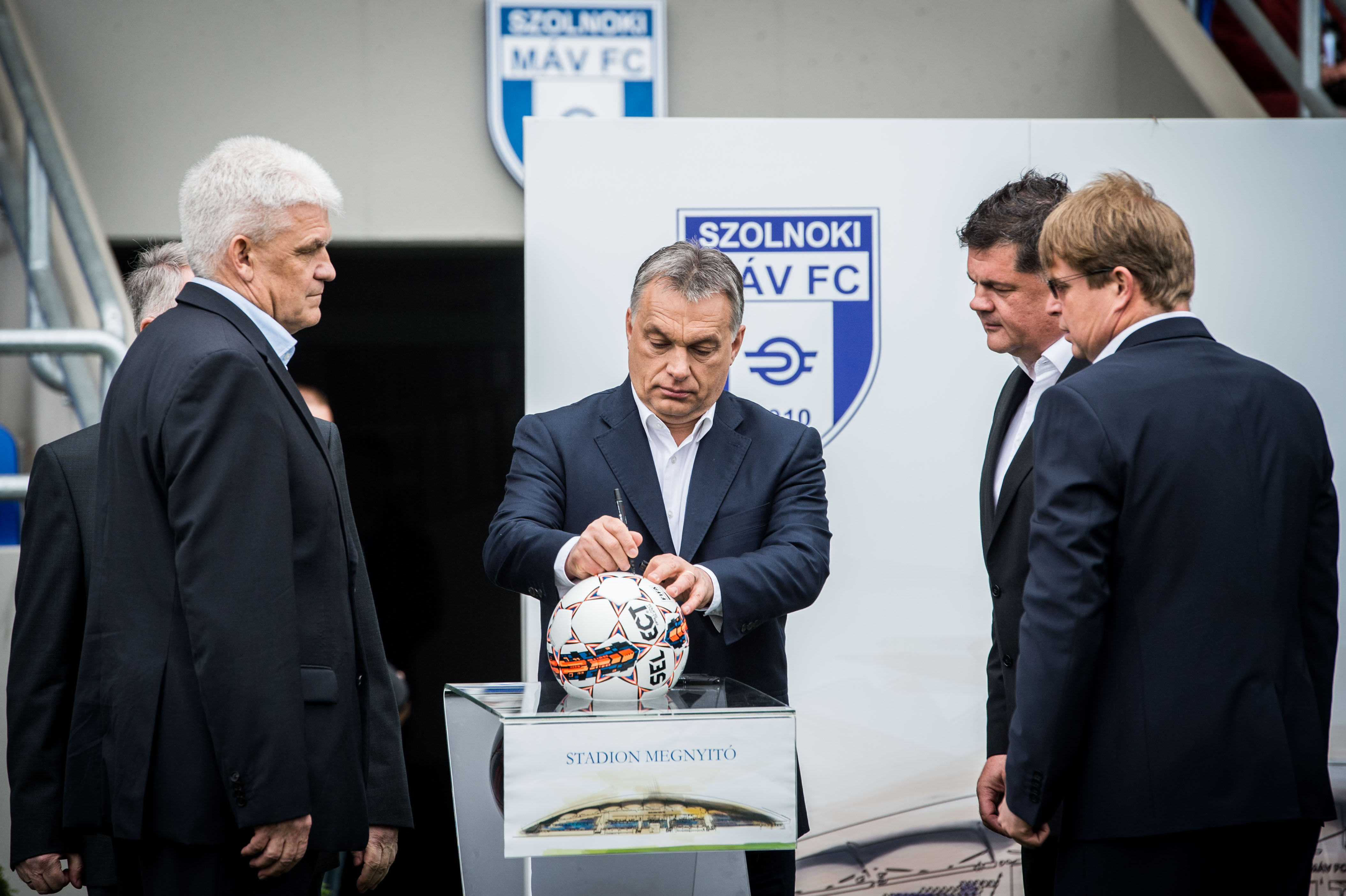
In his inauguration speech, Mr. Orbán said that the total cost of the comprehensive stadium development programme was over HUF 2 billion, of which stadium construction accounted for HUF 1.2 billion. From this sum, the local club – Szolnok MÁV Utánpótlás FC Kft. – raised some HUF 600 million, while the remaining funds were made available from the corporation tax revenues system. The state supported the project with an allocation of HUF 400 million, as part of the national stadium development programme.
On behalf of the Government, the Prime Minister expressed his thanks to the local Szolnok contractors, who “did what the nation demanded of them”.
Mr. Orbán said that on the site where the rebuilt stadium now stands, there had been “the remnants of socialism, which took its toll on the country”: concrete rubble, abandon, lack of money and often evidence of neglect. The city has now managed to overcome this, he said.
The Prime Minister said that health care in Szolnok has undergone a phase of major development over the last three years, with funding of HUF 15 billion. A dual-carriageway between Budapest and Szolnok is also being built. This was first placed on the agenda in 1989, when the local Fidesz group was founded.
Szolnok “has a guardian”; it is one of the cities in which public spaces, churches, hospitals, the City Hall, the cemetery, sports facilities, the swimming pool and the sports hall are all in order, he said. Its citizens love the city and care for it, and they elect leaders who treat the city’s troubles and concerns as if they were their own. The Prime Minister congratulated Szolnok on the progress it has made recently, saying that the sports hall was renovated at the beginning of the last decade, and a new swimming pool and water polo arena have also been built recently.
Mr. Orbán said that “It is not enough to dream; we have to know what we are good at”. The Hungarian nation not only excels in science and the arts, but can also be proud of its achievements in sport, he said.
The number of children and families caring more for their health has increased since the introduction of daily physical exercise in schools. The preservation of health begins with prevention, and “if we want our country to have strong young people with strong characters, we must spend on sport”, he stressed.
The Hungarian people have world-class athletes, so, Mr. Orbán asked, “Why should we be content with anything less in the future?” In order to discover young talent, “we must provide opportunities to every young person, regardless of where they live”. To achieve this, he said, “we need facilities, teachers and coaches”.
The Prime Minister drew applause when he announced that if the local people find a site for a new artificial turf pitch, and if they back this initiative, the Government will support the idea. In closing, the Prime Minister said that “If we Hungarians are prepared to put aside our differences, find our better selves and cooperate, we can achieve sensational results”.
Sándor Berzi, Vice-President of the Hungarian Football Association (MLSZ) said that the Tiszaliget Stadium is the first in a series of refurbished and rebuilt stadiums in Hungary which are being constructed as part of the National Stadium Development Programme, and this is thanks to the corporation tax revenue system.
After a ribbon-cutting ceremony, members of Szolnok’s youth team demonstrated their skills. The Division II match between Szolnok MÁV FC and Vác FC kicked off in the rebuilt stadium at 1.00 p.m.
According to press material distributed at the event, the original stadium was inaugurated on 4 December 1974. The Tiszaliget Stadium was the venue for the Hungarian People’s Republic Cup Final on 14 June 1988, played between Békéscsaba Előre and Budapest Honvéd. On 19 August 2006 some ten thousand spectators attended a (Division II) match, in which the guests were Ferencváros; the stadium never hosted a championship match with a higher attendance. As time went by, the physical condition of the stadium gradually deteriorated, and reconstruction works began in the summer of 2012. In the first phase of work, from 2012–13, the stadium’s main pitch, heating and floodlighting were completed, a transformer station and 24 square-metre scoreboard were installed, and an exterior fence was erected. In 2013–14 the northern, eastern and southern stands were demolished, followed by the main building in 2014–15. The latter was replaced with a new main building, off-street parking was created, and the western stand was also demolished. Construction of the new stands began in 2015–16, and a geothermal heat pump with attached heating system was installed. Heating and lighting are powered by renewable energy. Following completion of the works, the Tiszaliget Stadium has a capacity of 3,437.
